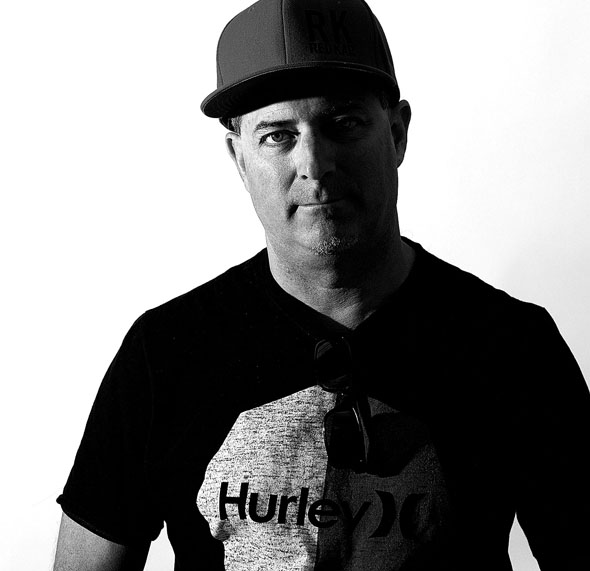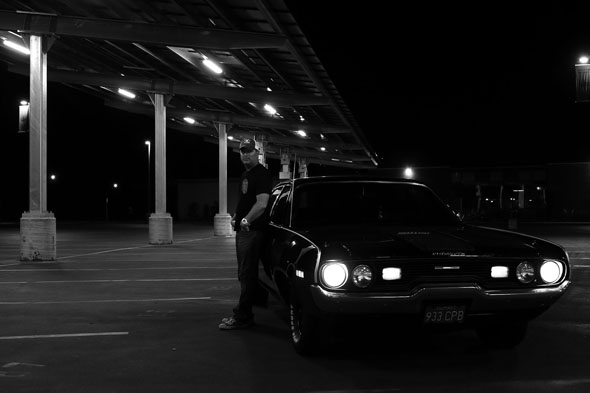Jeff Bentley

For Blue C’s Chief Creative Officer Jeff Bentley, a morning commute is a bit of a meditation. It’s only a couple of miles from his home to Blue C’s Costa Mesa offices, but it’s enough for him to get into a groove behind the wheel of one of his vintage cars and get in touch with what he defines as his “true self.”
For a lead creative at an advertising strategy agency, that’s not just a luxury, but a mandatory state of being that can make the difference between creating content that results in engagement and brand loyalty or apathy and boredom.
Bentley’s love of old cars comes from childhood. He grew up in Menlo Park where his father, an electronics engineer, used to work on old cars. He recalls a garage full of 1969 Cameros, 1972 Datsun 510’s and Jeeps. As a kid, he helped his father work on old cars. He later took up dirt biking, but gave that up after he got married and started a family. Three years ago, he picked up what he feels is an obsession with vintage cars after driving by the same exact “For Sale” sign on a classic Plymouth a couple dozen times.
“Maybe it’s in my DNA, but I think it is that those cars are pieces of art,” he explains. He takes cues from timeless craftsmanship and tries to absorb every aspect of the experience in his vintage cars, including the nostalgic scents. “They smell like my grandparents or my parents,” he said. “I love the smell of gas that you always smell in old cars.”
Bentley’s longing for this time and spirit of Americana informs a deeper understanding of Blue C’s clients, including Red Kap, a heavy-duty automotive workwear company for shop gear, construction workwear, and uniform apparel. He believes that he’s attuned to his clients’ target customers’ needs partially because of his love of cars and the surrounding culture.
For example, one of Red Kap’s ads features a man working under a car in a well-made mechanic’s shirt. The slogan reads, “Wear it. Crafted.” The concept clearly pulls in the “gear head” who might pay attention to details and durability, but won’t go for gimmicks. Undoubtedly, Bentley’s shared perspective gives him an edge on delivering content that can drive target audience engagement for such accounts. For Bentley, it’s about connecting to the product’s essence, and bringing its intrinsic value to life.

What cars do you currently own?
1971 Plymouth Satellite, 1972 Dodge Dart, 1965 Mercury Marauder, 1967 Pontiac LeMans, 2010 Dodge Charger. A few newer SUVs for my wife and daughter, and my son has a 2016 Toyota Tacoma lifted.
What were you driving before you began fixing up cars?
Before I got the Dodge Charger I drove the Kia Sorento, which now belongs to my daughter.
What did you feel you were missing when you bought the first old car?
I kept seeing it and it looked cool, and yet she was calling me to fix her up.
When did you get back to fixing up cars again?
About 3 years ago, I saw this 1971 Plymouth Satellite on the side of the road for sale, I passed that thing probably 30 times before I pulled over and called the guy. It was something I wanted to do with my son.
Why do you do this?
I love the fact that you crank windows by hand. It’s primitive. Creative is a lot like that, it’s simple ideas that work best and stand the test of time.
What parts of the cars do you tinker with?
The body, interior and some engine work. I suck at wiring.
Has your focus, inspiration or anything changed since you began working on cars?
Yes, I am all about storytelling now and really getting to the truth in what makes a great piece of art. I get more inspired easily with my cars as it fuels me to do my best. It has to have soul. If it doesn’t have soul or realistic values, I am not into it.
Which clients do you feel really get the benefit of your knowledge and appreciation for old cars and why?
I think all of them at some point, but I think particularly Red Kap, Maxxis Tires, and Monster Energy. I think my understanding of auto, the workings and the culture has allowed me to infuse my expertise and experience into understanding the target customers. Plus all guys in auto love old cars, it’s a great conversation starter.
What did your parents do for work?
My father was an electronics engineer for forever—very smart guy. My mother worked for Kodak for many years in payroll. They really instilled the handwork philosophy in us. I have a brother and sister.
Which cars did your parents enjoy fixing up with you and what was your role in it as far as you can recall?
Well they did all kinds of cars. From old Jaguars, MG’s, MGB’s, Willys and Jeeps. We also had at one point an old Stearman Biplane in the backyard, which we prepped for paint and assembly. My father was also a pilot for a hobby. As a family we always flew for vacations in small planes (I don’t fly.)
Anything that surprised you about the cars themselves or the impact this hobby had on you, since you began working on them? Your work or your bond with your son perhaps?
I think what surprises me is that I keep doing this and my wallet is shrinking. I think as a hobby it is more of a real passion. And at 50 I can have fun like my kids do, just with bigger toys.
How does your son help you? How old is he?
My son is 17. He loves to rip out the interiors and get under the car to unbolt things. He likes the rumble of the old engines; he can feel it. I don’t know if he likes the way they drive. [They’re] not as easy as new cars.
What sort of car do you think you’ll get next?
I am looking at a 1957 Chevy. Hmmm.
Very briefly, what is the most important thing about your path at Blue C?
I think the most important thing is that we do great work for our clients and have fun along the way. To do work that not only inspires our clients’ customers, but us as well. I want to wake up every morning yearning for more opportunity to create new ideas and make them come to life. To be real and authentic to myself as well.
Text by Valerie Demicheva

